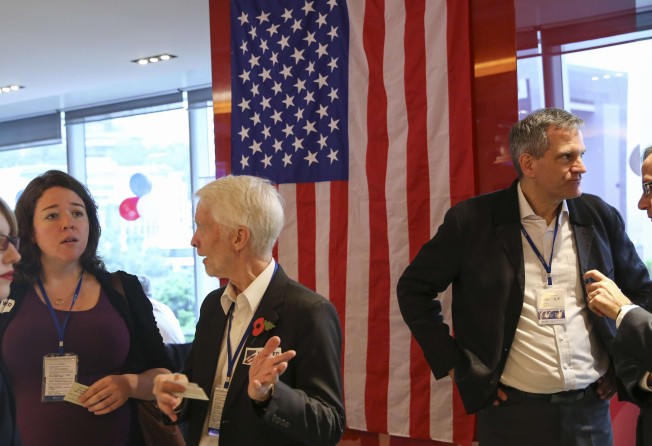Asian markets jittery ahead of US presidential election results
Hong Kong stocks fall to lowest level since August in morning trading, with race for White House on a knife-edge

Asian markets are slipping as the US presidential election results come in, with Hong Kong stocks dropping to their lowest level in intraday trading since August, as voting closes in most states across the country.
Polls in the remaining states will close at around 1pm Hong Kong time.
Early numbers show Republican candidate Donald Trump ahead of Democratic nominee Hillary Clinton, with the New York Times projecting Trump at a 77 per cent chance of winning.
Both candidates are poised to win critical states, as votes continue to be counted in battleground states such as Florida, Ohio, and Pennsylvania, but Trump has an early lead of around 140 electoral votes over Clinton’s 104.
As of 11:10 am in Asia, markets all around are taking losses.
Hong Kong’s Hang Seng plunged 2.51 per cent or 575.65 points to 22,333.82, its lowest level since early August, as investors reacted to Trump’s initial lead. The Hang Seng China Enterprises Index, or H-shares index, lost 3.58 per cent or 346.14 points to 9,313.71.
Tokyo’s Nikkei 225 decreased 2.23 per cent to 16,788.90, South Korea’s Kospi was down 0.97 per cent while in Sydney the All Ordinaries increased by 0.48 per cent.
In the mainland, the Shanghai Composite Index fell 0.79 per cent or 24.71 points to 3,123.18 while the CSI 300 — which tracks the large caps listed in Shanghai and Shenzhen — dropped 0.60 per cent or 20.26 points to 3,350.86.
The Shenzhen Composite Index lost 0.56 per cent or 11.67 points to 2,068.76 while the Nasdaq style ChiNext was down 0.80 per cent or 17.19 points to 2,133.11.
UBS chief investment officer Mark Haefele said in a morning note that investors are awaiting a final tally in key states, saying a Clinton victory would allow for a “strong start for global equities.”
The consensus among analysts before the election was that Clinton would win, an outcome investors appear to prefer as she is seen as more status-quo, while Trump is viewed as a volatile figure with hardline policies that could hurt the dollar and global trade.
“If Trump wins the White House, we expect the market will react negatively due to policy uncertainty and macro risk for Asia’s export-oriented economies,” analysts from DBS Group Research said in a report.
“A Trump presidency strikes fear in a large percentage of investors,” according to a report from Bespoke Investment Group.
Markets in Asia have risen in the past when polling was favourable to Clinton, with the Hang Seng, Nikkei, and Kospi all increasing on Monday following news the FBI’s investigation into Clinton’s emails did not reveal anything incriminating.
For Hong Kong, where the currency is pegged to the US dollar, the election result is particularly critical.
DBS analysts say the US dollar may weaken under Trump, strengthening non-US dollar assets such as the Japanese yen and gold. If Clinton wins, Hong Kong equities will rally and the US dollar will rebound, they said.
Bullion for immediate delivery dipped in early Asian trading, but are now up 3 per cent, more than US$1,300 a pound.
Offshore yuan traded in Hong Kong hit 6.8003 per US dollar in the early morning on Tuesday, a new intraday low, before bouncing back to close at 6.7983 at 6am, the lowest close price on record. It was trading at 6.7756 per US dollar as of 10:07am in Hong Kong.
The People’s Bank of China on Wednesday set the yuan reference point against the US dollar at 6.4832, 15 basis points weaker than the previous day, lower for the fourth consecutive day. Traders are allowed to trade up to 2 per cent either side of the reference point for the day.
The US presidential election is the “largest ‘known-unknown’ markets have had to contend with since the global financial crisis”, Nomura analysts said in a note on Tuesday.
“While a Trump victory would be seen as a win for ‘anti-trade’ and ‘anti-globalisation,’ it would also introduce a greater degree of uncertainty in terms of defence and international relations,” Jefferies analysts Sean Darby, Kenneth Chan, and Irene Zhou said in an earlier report.
In addition to constant anti-China rhetoric about the country stealing jobs from the US, Trump has pledged that as president he would impose a 45 per cent tariff on imports from China. This would be a “profound” move that could result in a trade war with China, according to Daiwa Capital Markets analysts Kevin Lai and Olivia Xia.
The import tariff rate on China is currently 4.2 per cent, and a hike up to even 15 per cent would have a “significant” impact on the Chinese economy, including a potential 1.75 per cent loss in gross domestic product over time, they said.
Clinton is also hawkish when it comes to China, but is more moderate compared to Trump, Lai and Xia said.
Both Clinton and Trump are opposed to the Trans-Pacific Partnership — a trade agreement to lower trade barriers among countries in the Pacific Rim, notably excluding China — which could threaten manufacturers in the Association of Southeast Asian Nations (Asean) countries.